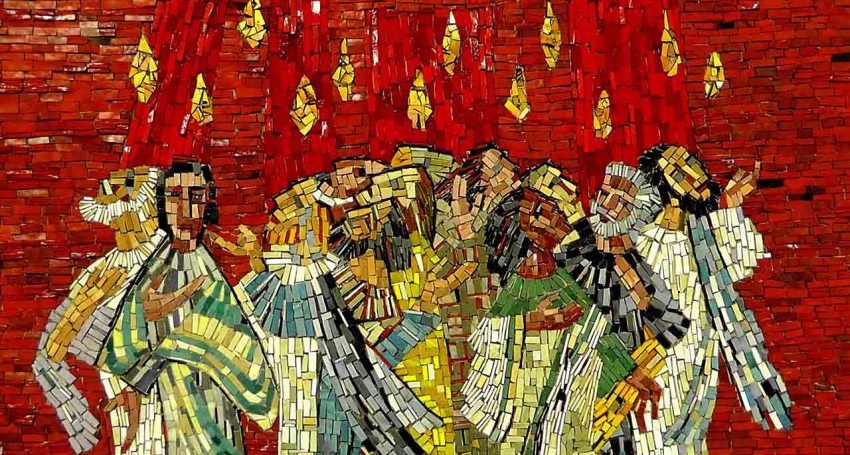Pentecost: fulfilment of ancient prophecy and a new awakening
Reflections
“Like Thomas we stretch out our hands to touch Jesus’ wounds, his sacramental Body and Blood of Christ, and, in this encounter, we not only experience ‘the peace that passes all understanding’, but we are renewed by the Spirit of him who enables us to be his servants of healing, compassion and reconciliation,” reflects The Ven. Keith Dean-Jones

I think that we all look for renewal in the life of the Church and in our own lives. Renewal is God’s gift, and it is a recognition that, by the grace of the Holy Spirit, we can experience a new awakening of faith, hope and love. The Holy Spirit makes us more like Jesus – the one who is complete in his humanity, and this is what we all seek.
In the New Testament, there are two main stories of the coming of the Holy Spirit. The story of the Acts of the Apostles is centred on the day of Pentecost. Long before Jesus was born, Pentecost (or ‘Shavout’) celebrated the first fruits of the corn harvest. During rabbinic times, it became a celebration of the giving of the Law at Mount Sinai, fifty days after Passover. Over the course of the centuries the holy prophets recognised that God had something more in store for his people than the observance of the 613 rules of the Torah (i.e. the Law). In the sixth century before Christ and at a time of foreign invasion, Jeremiah declared that “the days are surely coming, says the Lord, when I will make a new covenant with the house of Israel and the house of Judah…I will put my law within them, and I will write it on their hearts; and I will be their God, and they shall be my people” (Jeremiah 31.31,33).
The Day of Pentecost described by Luke the Evangelist is a fulfilment of prophecy (Acts 2.1-11). By the grace of the Holy Spirit, the disciples experienced both a new intimacy with the risen Christ and energy to proclaim the good news of salvation. Those who heard the disciples speak could understand the message, and the scattered children of Babel (i.e. all humanity) were drawn together into unity of joy and peace.
Advertisement
The other story of the Holy Spirit can be overlooked. This is from the Holy Gospel according to John. John the Evangelist links the gift of the Spirit to the cross and resurrection. It is on the evening of day of resurrection that the risen Lord appeared to the ten apostles in the upper room (John 20.19-31). He greeted them with peace, showed them his wounded hands and side and breathed on them and imparted the Holy Spirit. John states that Jesus had said at the Last Supper; “I will ask the Father, and he will give you another Advocate, to be with you forever” (John 14.15). This prayer is much more than words, for it is everything that Jesus did until he cried out from the cross, “It is finished” (or “It is accomplished”) (John 19.30). John adds, “Then he bowed his head and gave up his spirit”. Some commentators have suggested that the passage could be translated, “He gave out his spirit”.
I think that this story is important. There are times when we have ascended the mountain tops of transfiguration, and we remember occasions when the Holy Spirit has filled us with joy and peace. But there are other times when we have had to traverse the plains of crucifixion. Our hands have been scarred by loneliness, despair, doubt and failure, and we may have experienced a ‘dark night of the soul’. These plains are holy, for it is in embracing the cross that we have come to recognise that the risen Lord embraces us.
Advertisement
John’s account includes the story of Thomas’ incredulity. He was not present on the evening of the day of resurrection, and he had declared that, unless he would see the mark of the nails in the hands of Jesus and put his finger in the mark and his hand in his side, he would not believe (John 20.25). Eight days later, Thomas was present when Jesus appeared. Jesus invited him to touch his wounds, and the climax of the fourth Gospel is Thomas’ response, “My Lord and my God” (John 20.28).
I think that this is what happens every time we receive Holy Communion. Like Thomas we stretch out our hands to touch Jesus’s wounds, the sacramental Body and Blood of Christ, and, in this encounter, we not only experience “the peace that passes all understanding” (Philippians 4.7), but we are renewed by the Spirit of him who enables us to be his servants of healing, compassion and reconciliation. By his wounds we are healed, and by sharing our wounds with him we are enabled to be instruments of healing in the world.





